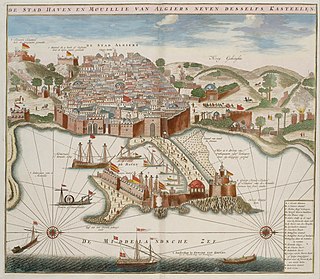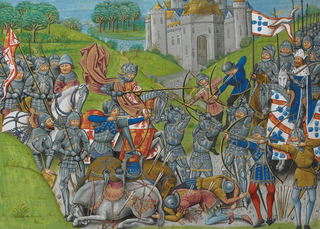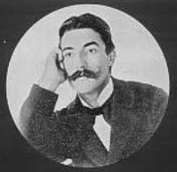
Luiz Gonzaga do Nascimento, Sr. was a Brazilian singer, songwriter, musician and poet and one of the most influential figures of Brazilian popular music in the twentieth century. He has been credited with having presented the rich universe of Northeastern musical genres to all of Brazil, having created the musical genre baião and has been called a "revolutionary" by Antônio Carlos Jobim. According to Caetano Veloso, he was the first significant cultural event with mass appeal in Brazil. Luiz Gonzaga received the Shell prize for Brazilian Popular Music in 1984 and was only the fourth artist to receive this prize after Pixinguinha, Antônio Carlos Jobim and Dorival Caymmi. The Luiz Gonzaga Dam was named in his honor.
New Christian was a socio-religious designation and legal distinction in the Spanish Empire and the Portuguese Empire. The term was used from the 15th century onwards primarily to describe the descendants of the Sephardic Jews and Moors baptised into the Catholic Church following the Alhambra Decree. The Alhambra Decree of 1492, also known as the Edict of Expulsion, was an anti-Jewish law made by the Catholic Monarchs upon the Reconquista of the Iberian Peninsula. It required Jews to convert to Catholicism or be expelled from Spain. Most of the history of the "New Christians" refers to the Jewish converts, who were generally known as Conversos while the Muslim converts were known as Moriscos.

António José de Almeida, GCTE, GCA, GCC, GCSE, was a Portuguese politician who served as the sixth President of Portugal from 1919 to 1923.

Antônio José da Silva Fagundes Filho is a Brazilian actor, playwright, voice actor, and producer. Renowned for his several performances in stage, film and television, where he frequently works in telenovelas.

Portugal competed at the 1928 Summer Olympics in Amsterdam, Netherlands.

Marco Antônio Barroso Nanini is a Brazilian actor. Most of his activities have been in comedy.
José António Prudéncio Conde Bargiela, known as José António, was a Portuguese footballer who played as a central defender.

The Battle of Blaye of 1593, also known as the Battle of Bec d'Ambès or Battle of the Gironde Estuary, was a naval Spanish victory that took place on 18 April 1593 off Blaye and Bec d'Ambès, Gironde Estuary, France, during the seven-month siege of Blaye between the French-Protestant forces of Henry of Navarre and the French-Catholic garrison of the city led by Governor Jean-Paul d'Esparbès de Lussan d'Aubeterre, in the context of the French Wars of Religion and the Anglo-Spanish War (1585–1604).

The recapture of Bahia was a Spanish–Portuguese military expedition in 1625 to retake the city of Salvador in Brazil from the forces of the Dutch West India Company (WIC).
The capture of Bahia was a military engagement between Portugal and the Dutch West India Company, that occurred in 1624, and ended in the capture of the Brazilian city of Salvador da Bahia by the latter. This capture was part of the Groot Desseyn plan of the Dutch West India Company. Although the Dutch intentions were reported to the Spanish no preventive counter-action was taken by them.

The Battle of Cape St Vincent of 1641 took place on 4 November 1641 when a Spanish fleet commanded by Don Juan Alonso de Idiáquez y Robles intercepted a Dutch fleet led by Artus Gijsels during the Eighty Years' War. After a fierce battle two Dutch ships were lost but the Dutch claimed only a hundred of their men were killed; the Spanish fleet also lost two ships but over a thousand dead. The damaged Dutch fleet was forced to abandon its planned attack on the Spanish treasure fleet.

The 2nd Bombardment of Algiers took place between 12 and 21 July 1784. A joint Spanish-Neapolitan-Maltese-Portuguese fleet commanded by the experienced Spanish Admiral Antonio Barceló bombarded the city, which was the main base of the Barbary corsairs, with the aim of forcing them to interrupt their activities. Massive damage and casualties were inflicted to the Algerians, while the loss aboard the allied fleet was low. The Dey of Algiers refused to start negotiations immediately but the fear of a third planned expedition under José de Mazarredo convinced him to negotiate a peace with the Spanish by which he was forced to cease large-scale piracy, signalling the effective end of the Barbary privateering until the outbreak of the Napoleonic Wars.
The action of 12–17 January 1640 was a naval battle between a Dutch fleet and a combined Spanish-Portuguese fleet during the Eighty Years' War. The battle took place on the Brazilian coast off Pernambuco and was an attempt by a fleet consisting of approximately eighty vessels transporting about 5,000 soldiers under the command of Portuguese Admiral Fernando de Mascarenhas to land reinforcements to bolster the Portuguese militia besieging the city of Recife. On 12 January this fleet was intercepted by a Dutch task force of about forty ships commanded by Willem Loos. The ensuing battle lasted with occasional breaks until the evening of 17 January, when the Spanish and Portuguese fleet retreated and sailed away to the north.

The Fernandine Wars were a series of three conflicts between the Kingdom of Portugal under King Ferdinand I and the Crown of Castile under Kings Henry II and later John I. They were fought over Ferdinand's claim to the Castilian succession after the murder of King Peter of Castile in 1369.

The naval Battle of Saltes Island or Battle of Saltes took place on 17 July 1381, off Saltes Island, between the Crown of Castile and the Kingdom of Portugal during the Third Ferdinand War. The Castilian fleet commanded by Don Fernando Sánchez de Tovar defeated decisively the Portuguese fleet led by João Afonso Telo. The result of the battle was the destruction of the naval offensive capability of Portugal, achieving the Castilian naval supremacy in the Atlantic Ocean.

The Third Fernandine War was the last conflict of the Fernandine Wars, and took place between 1381–1382, between the Crown of Castile and the Kingdoms of Portugal and England. When Henry II of Castile died in 1379, John of Gaunt, 1st Duke of Lancaster claimed their rights of the throne of the Kingdom of Castile, and found an ally Ferdinand I of Portugal.
Events in the year 1899 in Portugal.
Events in the year 1875 in Portugal. There were 455,000 registered voters in the country.
João Afonso Telo,, mayor of Lisbon in 1372, admiral of Portugal from 1375 – 1376, and sixth Count of Barcelos, was a member of the highest ranks of the nobility, member of the Téllez de Meneses lineage as a descendant of Tello Pérez de Meneses.












